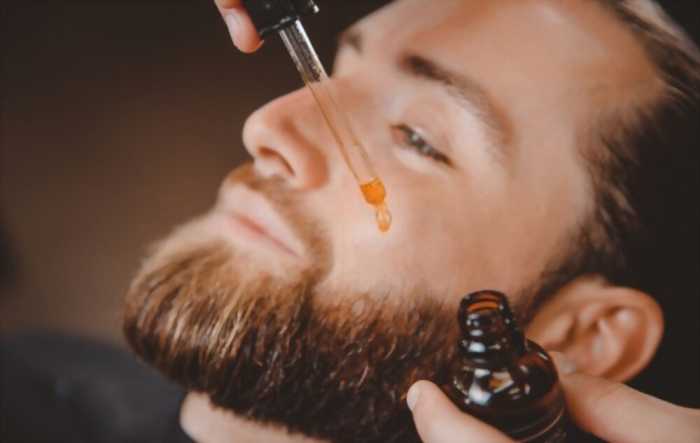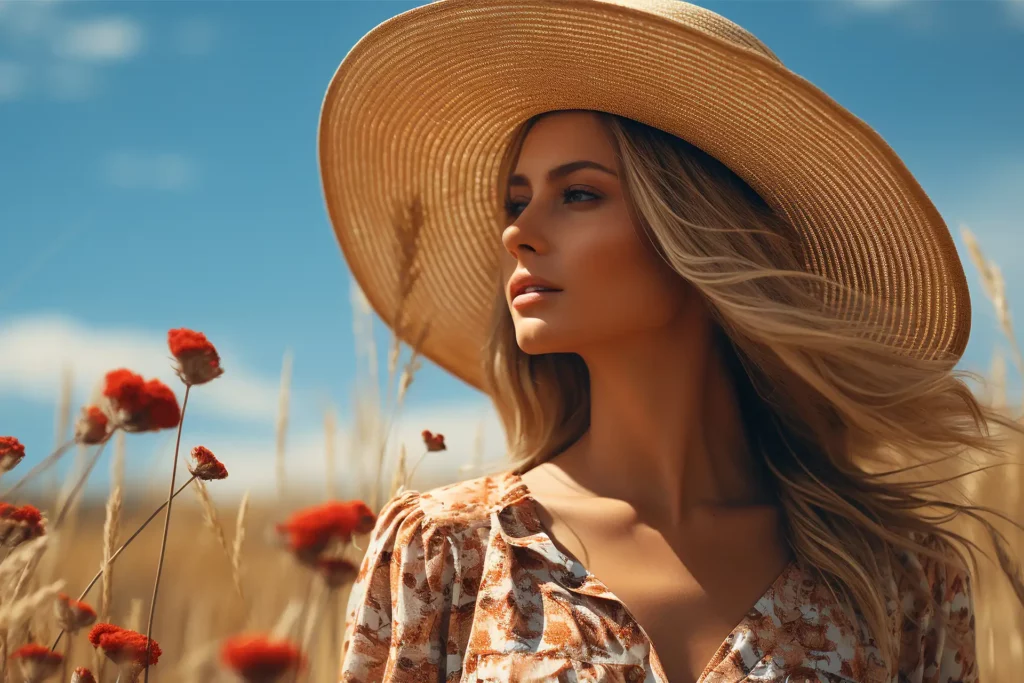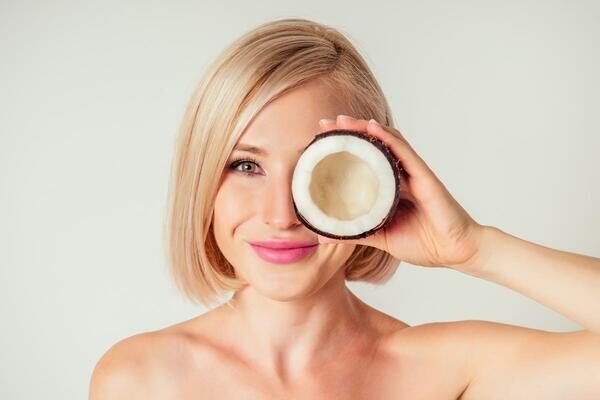The beard, sometimes referred to as a sign of masculinity, and at other times believed to be a sign of uncouthness or rebellion, has been making a huge comeback over recent years, and it’s estimated that today approximately 55% of men worldwide have some sort of facial hair. But what’s the reason for this latest trend? Research has shown that it’s down to five variables which spark the decision to first grow a beard. Firstly and foremost, the beard grower just likes the look of it, and it’s a way of making a statement, and adding a new dimension to their look. It could be at the suggestion of someone that they like, admire or want to impress.  Another reason for growing a beard is simply the climate, men tend to grow facial hair to protect them against the elements of snow, rain, ice and wind. Then there is simply laziness, although as any beards man will tell you, maintaining a beard is a whole lot of work in itself if you don’t want to look like a drop-out with a matted mane reminiscent of an untidy bird’s nest, and probably just as unhygienic. The last reason is to hide what’s underneath, perhaps to cover scarring, a weak chin, or an otherwise young appearance.
Another reason for growing a beard is simply the climate, men tend to grow facial hair to protect them against the elements of snow, rain, ice and wind. Then there is simply laziness, although as any beards man will tell you, maintaining a beard is a whole lot of work in itself if you don’t want to look like a drop-out with a matted mane reminiscent of an untidy bird’s nest, and probably just as unhygienic. The last reason is to hide what’s underneath, perhaps to cover scarring, a weak chin, or an otherwise young appearance.
On average men have about 30000 hair follicles on their face, with the greatest concentration being on the upper lip and chin. Facial hair first starts to be noticeable at around age 14-16, at the later stages of puberty or adolescence, although it may resemble peach fuzz at first, but typically does not start to appear on the whole area of the lower chin and face until a few years later, even up to the age of 21 although, as with all biological processes, it can vary. Hair growth starts after the follicles are stimulated when testosterone starts to produce the hormone DHT (dihydrotestosterone). The ability to grow a thick beard is dominated by genetics and ethnicity, rather than a lack of testosterone, and a beard grows at an average rate of 0.5 inches (1.27 cm) a month.
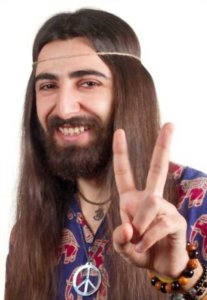 Although today the beard is a personal choice and can be grown in a range of styles for individuality, it has a very colourful and interesting history throughout the ages, being largely interspersed with culture and religion. History dictates that it was seen as a mark of masculinity and virility (which is why monks and clergymen were traditionally clean-shaven as a sign of their celibacy), wealth and status, and even wisdom. So revered was the beard that certain punishments may even have included the shaving of a beard. History also tells of a beard tax imposed in Russia by Peter the Great in 1698, and King Henry VIII and his daughter Elizabeth I of England also imposing a tax on all beard growth of over two weeks! At times armies have been instructed to have facial hair to show their strength and superiority, much in the same way that a lion sports a mane, although the possible use of gas masks in later years meant that beards were banned as they did not allow the masks to fit properly. Certain professions also encouraged the growth of a beard, for instance to protect the voice and throat for public speakers. Beards have been used as a sign of wealth and authority, and also as a marker of being anti-establishment, for instance with the ‘hippies’ in the 1960’s.
Although today the beard is a personal choice and can be grown in a range of styles for individuality, it has a very colourful and interesting history throughout the ages, being largely interspersed with culture and religion. History dictates that it was seen as a mark of masculinity and virility (which is why monks and clergymen were traditionally clean-shaven as a sign of their celibacy), wealth and status, and even wisdom. So revered was the beard that certain punishments may even have included the shaving of a beard. History also tells of a beard tax imposed in Russia by Peter the Great in 1698, and King Henry VIII and his daughter Elizabeth I of England also imposing a tax on all beard growth of over two weeks! At times armies have been instructed to have facial hair to show their strength and superiority, much in the same way that a lion sports a mane, although the possible use of gas masks in later years meant that beards were banned as they did not allow the masks to fit properly. Certain professions also encouraged the growth of a beard, for instance to protect the voice and throat for public speakers. Beards have been used as a sign of wealth and authority, and also as a marker of being anti-establishment, for instance with the ‘hippies’ in the 1960’s.
Ancient Greeks and Mesopotamians led the way in beard care, dressing their beards, treating them with beard oils and even using ancient tongs to create ringlets. Today it’s no longer acceptable to be sporting a “couldn’t be bothered to shave” look, and the beard look is well groomed. There is now a massive array of oils, balms and waxes to help keep the beard looking at its very best at all times. That’s good right? Unfortunately not, since not all products are made equal. With the high demand for these products, companies are promising remarkable results but using cheap and harsh synthetic ingredients to increase their profit margin, instead of maintaining the integrity of their product. 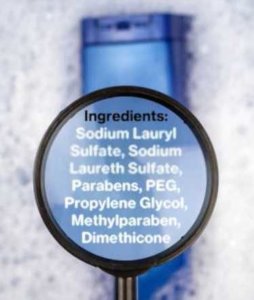 Parabens, polyethylene glycol, phthalates, formaldehyde, oxybenzone, sulphates, toluene, mercury, mineral oil, animal oils, plus synthetic colours and fragrances are commonly used. They can cause skin irritation, contact dermatitis, rosacea, and increase skin ageing and DNA damage through skin reaction with UVB, can disrupt the endocrine system causing development, reproductive and neurological damage, and can also cause cancer, organ toxicity and respiratory difficulties. Most of these chemicals are used to act as preservatives, colourants, emollients, plasticisers, etc, but there is a natural counterpart for all of these functions. For instance vitamin E is a natural preservative, but instead of being a toxin and harming the body, it is a strong antioxidant helping to protect the skin against the harmful effect of free radicals, and reducing UV damage, and promoting overall skin health.
Parabens, polyethylene glycol, phthalates, formaldehyde, oxybenzone, sulphates, toluene, mercury, mineral oil, animal oils, plus synthetic colours and fragrances are commonly used. They can cause skin irritation, contact dermatitis, rosacea, and increase skin ageing and DNA damage through skin reaction with UVB, can disrupt the endocrine system causing development, reproductive and neurological damage, and can also cause cancer, organ toxicity and respiratory difficulties. Most of these chemicals are used to act as preservatives, colourants, emollients, plasticisers, etc, but there is a natural counterpart for all of these functions. For instance vitamin E is a natural preservative, but instead of being a toxin and harming the body, it is a strong antioxidant helping to protect the skin against the harmful effect of free radicals, and reducing UV damage, and promoting overall skin health.
With natural products all the ingredients are active, concentrated and potent, and focused on nourishing and protecting without the harsh side effects, and a little goes a long way. While a beard may be predominantly influenced by genetics and ethnicity, as previously mentioned, that doesn’t mean that Mother Nature can’t still lend a helping hand. The key to a full beard is imperative to healthy skin and follicles, in addition to taking care of the hair itself, so no beards man should be without a quality oil made from 100% natural products incorporated into his daily grooming routine. Failure to keep the beard and skin underneath well moisturised and healthy, will make the beard appear dry and brittle and unpleasant to the touch. Additionally, hair loss, breakage, or bald patches will be more prevalent, beard ruff can appear, it can be itchy, and will be harder to style and maintain. Here’s our recommendation to promote the best beard possible:
Carrier Oils
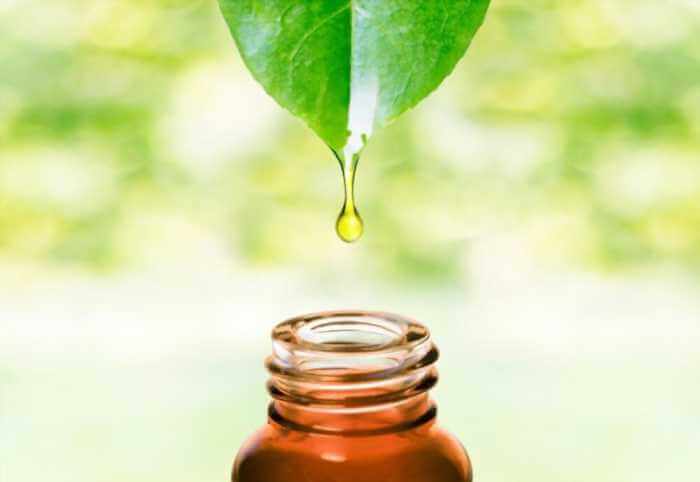 These are natural vegetable oils, extracted by cold pressing from the nut, kernel or seed of plants. They help to carry the therapeutic properties of essential oils into the skin, since essential oils evaporate quickly and are too concentrated to apply directly to the skin. Nevertheless, carrier oils have an array of benefits in their own right, being exceptionally beneficial to the health of skin and hair, and can be used alone.
These are natural vegetable oils, extracted by cold pressing from the nut, kernel or seed of plants. They help to carry the therapeutic properties of essential oils into the skin, since essential oils evaporate quickly and are too concentrated to apply directly to the skin. Nevertheless, carrier oils have an array of benefits in their own right, being exceptionally beneficial to the health of skin and hair, and can be used alone.
Jojoba Oil
Jojoba oil is the most commonly used oil in commercially available products for beard care, and is packed with fatty acids, vitamin E, carbohydrates, and minerals that are essential for beard health. Although called an oil, Jojoba is technically a wax, and is biologically very similar to the skin’s own sebum. Hypoallergenic, it is suitable for all skin types, even the most sensitive. Odourless and colourless, this oil is very easily absorbed and will deeply nourish the skin and hair roots, and restore the pH level of the hair. It balances sebum production and will eliminate oily or dry skin problems, while the antimicrobial, antibacterial and antifungal properties will protect against conditions like acne, eczema, beard ruff, itchiness, psoriasis, and in-grown hairs. Jojoba Oil conditions and moisturises the beard, repairs cell damage, and strengthens the hair shaft, thickening the hair strands and promoting healthy beard growth. As a lightweight oil, it does not penetrate the hair as deeply as other oils, but creates a protective barrier, filling in the cracks of damaged hair, and protecting against further damage by UV, heat and oxidative stress. Wave bye bye to frizziness and hair breakage with Jojoba Oil, it will leave the beard shiny with health, soft and manageable. Additionally, Jojoba Oil has a long and stable shelf life, 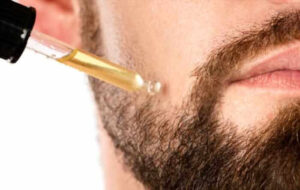 and can act as a preservative for your oil blends.
and can act as a preservative for your oil blends.
Argan Oil
Argan oil is the perfect choice for beard oil and is a core ingredient in many of the beard products found such as oils, balms, waxes, shampoos, conditioners and heat protectors. That’s because it’s a truly impressive oil for skin and hair care with an abundance of poly-unsaturated fatty acids, namely oleic (omega 6) and linoleic acid (omega 9), and active compounds, including vitamin E, all working in unison to offer superb hydration, reduce inflammation and repair the skin’s barrier, improve the skin’s elasticity, promote beard health and growth. Argan oil can help to regulate the sebum, preventing spots or acne and reducing dry skin, thus effectively diminishing beard patchiness caused by hair loss due to blocked follicles, and eliminating beard ruff and itchiness. Healthy skin and hair follicles, is the key to good growth. Furthermore, Argan Oil is a lightweight oil and easily absorbed, and will soothe and protect against in-grown hairs, reduce and further protect against brittleness and breakage, tame frizziness, act as detangling and styling agent, protect against heat damage if using beard straighteners or a hair dryer, protect from sun damage, and make the beard soft and manageable with a healthy shine.
Grapeseed Oil
Grapeseed Oil has a high content of vitamin E and other antioxidants, plus fatty acids and essential vitamins and minerals. Light, odourless, and extremely versatile, this oil is a great addition to a beard care regime. Hypoallergenic, it is suitable for any skin type, and is particularly suited for dry, dull hair, fine, thinning or damaged beards, curly beard hair, for slow growth and to soothe psoriasis. Grapeseed Oil offers superior abilities to treat brittle and weak hair and hair loss, and effectively fights beard ruff and dermatitis. Excellent to massage into the beard, it boosts the blood circulation to the skin to stimulate hair follicles and boost growth. Ultra lightweight and hydrating, this oil perfectly moisturises and is gentle enough for a fine or thinning beard, yet nourishing enough for a thick, curly or coarse beard. Grapeseed Oil protects against UV, oxidant and heat damage, strengthens the hair structure and restores texture. It can calm and reduce the symptoms of beard ruff and psoriasis, and is non-comedogenic. Perfect for adding shine, reducing frizz and as a detangling and styling agent. An excellent way to add strength and shine.
Essential Oils
Essential Oils are the concentrated chemical compounds extracted from plant parts such as roots, seeds, leaves, flowers or bark, through distillation, either steam or water, or via a mechanical method such as cold pressing. It is these highly potent compounds which give the plant its unique aroma and taste – its very essence. Essential oils have been used for thousands of years for their wonderful scent and therapeutic properties. Inhaling essential oils stimulates the olfactory nerves and impacts the amygdala, which is the emotional centre of the brain, influencing mood and behaviour. They can also be absorbed through the skin, and pack a punch in hair and skin care. So here’s a selection to add to your beard oil, specifically picked to boost the mood while enjoying the delicious fragrance, and installing a wealth of benefits to the beard and skin:
Frankincense Oil
Aroma: sweet, warm, woody with hints of spice and citrus. Possesses the ability to make other aromas richer and more intriguing.
Blends well with: Lavender, Sandalwood, Bergamot
Aromatherapy: soothes tension and stress. Restores emotional balance. Boosts focus.
Properties: promotes skin elasticity, stimulates cell renewal, slows the natural ageing of the skin, promotes skin healing, regulates sebum production. Soothes and nourishes the skin and hair follicles, 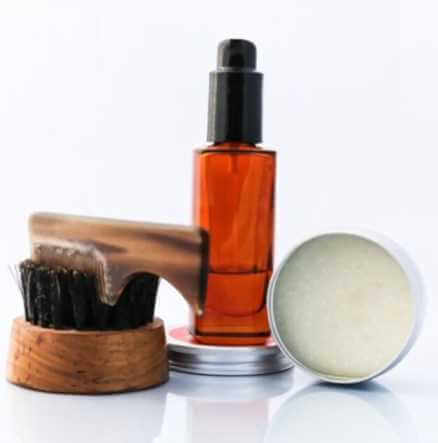 relieves razor burn, protects against skin blemishes, in-growing hairs and inflammation. Promotes healthy beard growth.
relieves razor burn, protects against skin blemishes, in-growing hairs and inflammation. Promotes healthy beard growth.
Bergamot Oil
Aroma: light fresh citrusy, combined with some floral notes, and a masculine undertone
Blends well with: Eucalyptus, Lavender, Sandalwood, Tea Tree, Frankincense, Peppermint
Aromatherapy: relieves anxiety and depression. Invigorates and improves the mood and self-confidence.
Properties: promotes skin regeneration. It has antibacterial and antifungal effects to soothe skin conditions, accelerate skin repair, and protects the skin and facial hair from bacteria. Refreshes, nourishes, and imparts a strengthening effect on the skin. Encourages blood circulation in the dermis layer, and stimulates the hair follicles and beard growth. It has a deodorising effect to keep the facial hair fresh. Provides one of the highest levels of antioxidant activity to protect against external factors.
Clove Bud Oil
Aroma: spicy, warming, comforting
Described as “undoubtedly one of the most gratifying scents in existence to the smelling nerve”.
Blends well with: Sandalwood, Lavender, Bergamot
Aromatherapy: invigorating, uplifting and mentally stimulating
Properties: strong antimicrobial, antifungal and antioxidant properties. Calms irritated and itchy skin. Exfoliates the skin. Resolves skin conditions, including beard ruff. Improves blood circulation, revives sagging skin and reduces fine lines and wrinkles. Deep cleanses the hair follicles, strengthens, repairs and adds a healthy shine to the hair, thus promoting growth and reducing breakage and loss. Also helps to retain the beard colour.
Eucalyptus Oil
Aroma: woody, herbaceous, camphorous, minty
Blends well with: Bergamot, Lavender, Peppermint, Tea Tree
Aromatherapy: calms anxiety, invigorates eliminates lethargy. Promotes mental clarity.
Properties: antibacterial, antifungal and antioxidant for good skin health. Reduces the appearance of ageing. Moisturises and seals the skin, and relieves skin inflammation and skin conditions including beard ruff.  Promotes blood circulation and stimulates and nourishes the hair follicles. Adds shine and thickens the hair. Makes the facial hair soft and smooth. Eliminates hair loss/patchy beard due to stress.
Promotes blood circulation and stimulates and nourishes the hair follicles. Adds shine and thickens the hair. Makes the facial hair soft and smooth. Eliminates hair loss/patchy beard due to stress.
Lavender Oil
Aroma: floral herbaceous with a woody undertone
Blends well with: Bergamot, Clove Bud, Sandalwood, Eucalyptus, Frankincense, Peppermint, Tea Tree
Aromatherapy: calms and relaxes. Relieves anxiety and depression.
Properties: has analgesic and skin healing properties. Suitable for all skin types. Reduces inflammation and itching, and soothes skin conditions. Treats beard ruff. Effective for the treatment of alopecia areata, a condition causing hair loss. Studies show that Lavender Oil promotes hair growth (by 44% according to one study), and it also grows quicker and thicker. Revitalises the appearance of the beard hair and adds a healthy shine.
Peppermint Oil
Aroma: sharp, cool, refreshing, menthol
Blends well with: Eucalyptus, Lavender, Bergamot, Tea Tree
Aromatherapy: refreshing, stimulating and uplifting.  Dispels mental fatigue and promotes mental clarity and enhanced concentration.
Dispels mental fatigue and promotes mental clarity and enhanced concentration.
Properties: cools and invigorates the skin. Anti-inflammatory, antifungal, antimicrobial, healing effect. Suitable for all skin types. Calms skin irritations and relieves itching. Has a healing effect on infected blemishes, cuts and acne. Promotes skin rejuvenation. Prevents beard ruff, itching and ingrown hairs. A natural hair stimulant. Increases blood circulation, thus providing the hair follicles with more nutrients. Several studies have confirmed that Peppermint stimulates hair growth, and the density of the hairs. Believed to activate the IGF-1 growth hormone in the follicle, reducing the resting stage and kick-starting growth, thus resulting in a thicker fuller beard.
Sandalwood Oil
Aroma: warm, rich and woody
Blends well with: Frankincense, Bergamot, Clove Bud Oil, Lavender
Aromatherapy: soothes and relaxes. Relieves irritability, reduces anxiety, fear and panic attacks. Promotes mental clarity and cognitive function.
Properties: suitable for use on all skin types. Improves blood circulation and complexion, refreshes the skin, regulates sebum production, eliminates flabbiness and restores elasticity. Penetrates deep into the skin to deliver moisture. Anti-inflammatory, antiseptic and antibacterial to fight against acne, relieve irritation, itching, and inflammation, and prevent beard ruff. Improved circulation to the hair follicle and healthy skin provides optimum conditions for healthy beard growth.
Tea Tree Oil
Aroma: fresh, herbaceous, camphorous
Blends well with: Eucalyptus, Lavender, Bergamot, Peppermint
Aromatherapy: relieves fatigue and nervous depression
Properties: strong anti-inflammatory, antibacterial, antifungal, anti-itching. Suitable for use on all skin types. Regulates sebum production, calms the skin, soothes irritation and supports wound healing. It helps to treat psoriasis and seborrhoeic dermatitis, relieves acne. Deep cleanses the pores and removes impurities. Improves blood circulation and complexion, refreshes the skin, eliminates flabbiness and restores elasticity. Prevents beard ruff. Promotes the appearance of the skin and hair. Unclogs hair follicles which can impact on beard growth. Fortifies the beard and adds strength.
How to Apply
For best results apply the oil after taking a shower or washing the face in order to seal in the moisture. Place 3-5 drops in the palm of your hand and gently warm the oil between the palms before applying to the beard. Use a beard comb to ensure that the oil is evenly distributed throughout the entire beard. Style as required.
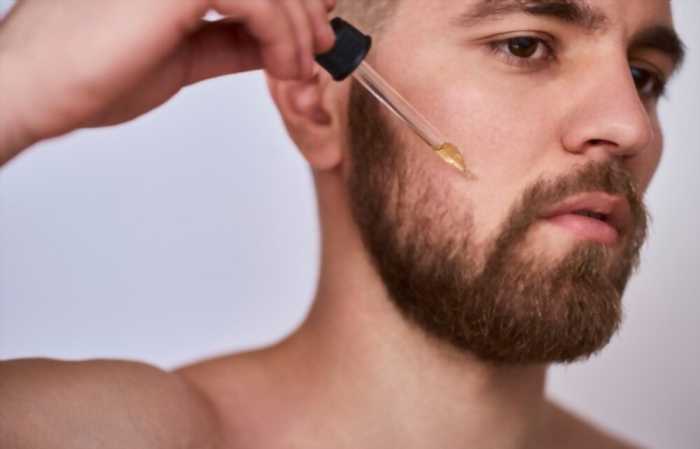
Fragrance-Free Beard Oil Recipe
3 Tbsp. Jojoba Oil
2 Tbsp. Argan Oil
2 Tbsp. Grapeseed Oil
Fragranced Beard Oil Recipe
Add 3-4 drops of your chosen essential oils to the above mix.
Place all the ingredients in a glass jar or bottle (dark glass is best) and mix well. Store in a cool, dry place.
Have fun creating your own unique blends, and be amazed at what naturally oils can do for the health and appearance of your skin and beard.
